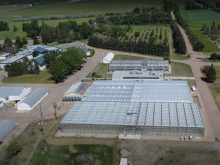After numerous delays, a court case pitting organic growers against biotechnology firms has been scheduled for next month.
Larry Hoffman, L.B. Hoffman Farms Inc. and Dale Beaudoin filed the original statement of claim nearly three years ago on Jan. 10, 2002.
It alleges the organic growers have suffered financial losses due to the introduction of genetically modified canola by Monsanto Canada and Bayer CropScience.
The growers who filed the claim want to open the case so any Saskatchewan organic farmer certified after Jan. 1, 1996, can seek damages from the two biotech firms.
Read Also

Alberta crop diversification centres receive funding
$5.2 million of provincial funding pumped into crop diversity research centres
On Nov. 1-2, lawyers for both sides are expected to appear in Saskatoon’s Court of Queen’s Bench where they’ll argue whether there are grounds for the case to proceed as a class action lawsuit.
Counsel for Monsanto is expected to argue the case does not meet the five criteria required for certification under the Class Actions Act and should be dismissed.
“We believe groups such as the Saskatchewan Organic Directorate, Greenpeace and the British Soils Association are simply using this lawsuit as a platform to advance their anti-GMO position in the public arena and this is not an appropriate use of the court’s time and resources,” said Monsanto spokesperson Trish Jordan.
Arnold Taylor, president of the Saskatchewan Organic Directorate, the group co-ordinating the class action suit, said while the groups may share the same beliefs on GM canola, SOD hasn’t received direct funding from Greenpeace or the British Soils Association.
“We’re representing 1,000 hard-working certified organic farmers who have real concerns about the fact that we can’t buy canola seed without GMO contamination.”
While the two sides are exchanging public barbs via the media, the plaintiffs’ claims will not be debated at the certification hearing, which is a procedural inquiry to see if the case deserves to be tried as a class action suit.
The hearing was previously scheduled for September but was delayed at the last minute until Nov. 1-2.















